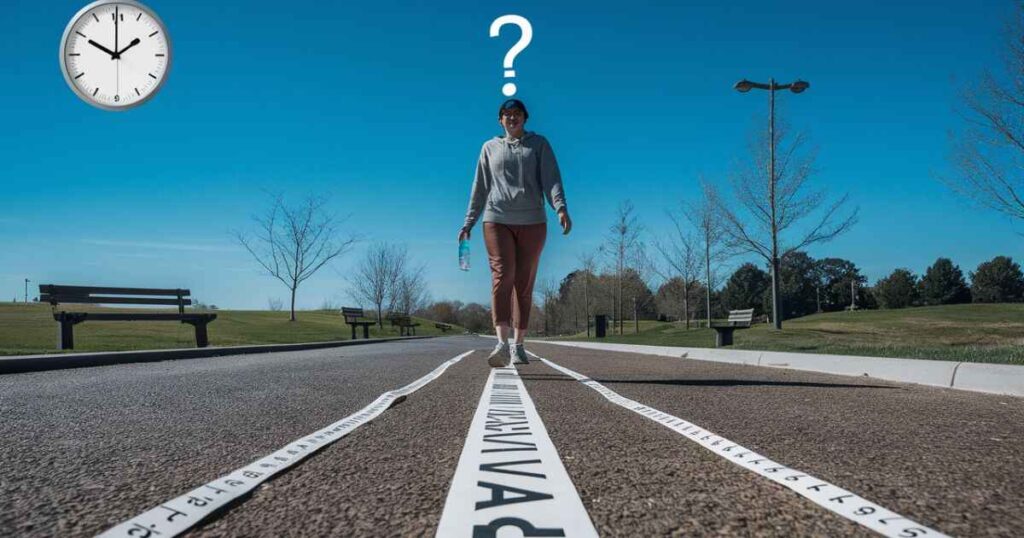Walking 2 miles is a popular fitness goal for many people. The time it takes to cover this distance can vary based on factors like age fitness level and terrain. On average it takes about 30 to 45 minutes to walk 2 miles at a moderate pace. This activity can be a great way to improve cardiovascular health burn calories and boost overall well-being.
Ever wondered if you could walk to the moon? While that might be a stretch walking 2 miles a day could add up to some impressive distances over time! Imagine covering the length of your state or even crossing an entire country on foot. It all starts with those first two miles.
How Long Does It Take to Walk 2 Miles?

Walking time can vary wildly depending on your fitness level, the terrain, and even your mood. On average, most folks can cover this walking distance in about 30 to 45 minutes. But don’t sweat it if you’re not hitting that mark just yet everyone’s journey is different!
Your walking speed plays a big role in how quickly you’ll conquer those 2 miles. If you’re strolling along at a leisurely pace, chatting with a friend, it might take closer to an hour. But if you’re power walking like you’re late for the bus, you could shave that time down to 30 minutes or less.
How far is 2 miles?
Two miles might not sound like much, but it’s a solid chunk of ground to cover on foot. To put it in perspective, 2 miles is about 3.2 kilometers. That’s roughly the length of 35 football fields laid end to end! Or, if you’re more of a step counter, you’re looking at somewhere between 4,000 to 5,000 steps, depending on your stride length.
If you’re in a city, 2 miles could take you from one neighborhood to another. In the suburbs, it might be a round trip to the local park and back. No matter where you are, 2 miles is a distance that’s totally doable for most people, whether you’re a seasoned walker or just starting out on your fitness journey.
Read More: The Top Fantasy Football Team Names for 2024
Average time to walk 2 miles for women by age
Now, don’t get too hung up on these numbers. They’re just averages, and every woman is unique. Your personal fitness level, walking routine, and even the shoes you wear can all affect your speed. The important thing is to find a pace that challenges you without leaving you gasping for air.
Ladies, let’s talk about walking pace. Your age can play a role in how quickly you cover those 2 miles. Here’s a rough guide to average walking time for women by age group:
| Age Group | Average Speed (mph) | Approximate Time for 2 Miles |
| 20-29 | 4.0 | 30 minutes |
| 30-39 | 3.8 | 32 minutes |
| 40-49 | 3.7 | 33 minutes |
| 50-59 | 3.5 | 35 minutes |
| 60+ | 3.2 | 38 minutes |
Average time to walk 2 miles for men by age
Now, before you start comparing yourself to these numbers, remember that they’re just averages. Your personal walking speed can be influenced by a whole host of factors. Maybe you’ve got long legs that eat up the ground, or perhaps you’re built more for endurance than speed.
These times are based on a steady, brisk walking pace. If you’re new to regular walking, don’t worry if you’re not hitting these marks right away. The beauty of walking is that it’s an exercise routine you can easily tailor to your current fitness level. Start where you’re comfortable and gradually increase your pace and distance.
| Age Group | Average Speed (mph) | Approximate Time for 2 Miles |
| 20-29 | 4.3 | 28 minutes |
| 30-39 | 4.1 | 29 minutes |
| 40-49 | 4.0 | 30 minutes |
| 50-59 | 3.8 | 32 minutes |
| 60+ | 3.5 | 35 minutes |
What are the health benefits of walking?

1. Improves heart health
Lace up those sneakers, because walking is like a love letter to your heart! Regular walking routines can significantly boost your cardiovascular health. By getting your heart pumping at a steady pace, you’re strengthening this vital muscle and improving your overall circulation.
2. Help in losing weight
Looking to shed a few pounds? Walking might just be your new best friend. A brisk 2-mile walk can burn anywhere from 150 to 200 calories, depending on your weight and walking pace. Make it a daily walking routine, and you’re looking at a significant calorie burn over time.
3. Reduces the risk of dangerous diseases
Walking isn’t just good for your heart it’s like a shield against a whole host of health issues. Regular physical activity like walking has been linked to lower risks of type 2 diabetes, certain cancers, and even stroke. In fact, studies have shown that walking for just 30 minutes a day can reduce your risk of type 2 diabetes by up to 30%.
4. Boost immunity
Want to give your immune system a leg up? Take a walk! Regular walking can help boost your body’s natural defenses. It increases the circulation of white blood cells, which are the body’s front-line soldiers against infections. Some studies have even suggested that a moderate-paced walk can reduce your risk of catching a cold by up to 43%.
5. Improves brain health
Walking isn’t just a workout for your body it’s a boost for your brain too. Regular physical activity like walking has been shown to improve cognitive function and reduce the risk of mental decline as we age. It increases blood flow to the brain, promoting the growth of new neural connections.
6. Encourages creative thinking
There’s a reason why some of history’s greatest thinkers were avid walkers. The rhythmic nature of walking, combined with a change of scenery, can help unlock your creative potential. A Stanford study found that walking increased creative output by an average of 60%.
7. Increases energy
It might seem counterintuitive, but a walk could be just what you need to boost your energy levels. Regular walking routines increase oxygen flow through the body, which can help you feel more alert and energized. It also triggers the release of endorphins, those feel-good hormones that give you a natural energy boost.
8. Strengthens bones and muscles
Walking isn’t just about cardio it’s a full-body workout that can help strengthen your bones and muscles. The impact of each step helps stimulate bone cell production, which can reduce the risk of osteoporosis. It’s particularly beneficial for your leg muscles, core, and glutes.
9. Improves mood and mental health
Look no further than your own two feet! Walking has been shown to have powerful effects on mental health. It releases endorphins, which are natural mood elevators, and can help reduce symptoms of anxiety and depression. A study in the British Journal of Sports Medicine found that walking for just 10 minutes a day could improve mental health.
How do you make a 2-mile walk interesting?

Change your walking route.
Tired of the same old scenery? Shake things up! Exploring new walking routes can turn your daily stroll into an adventure. Try different neighborhoods, local parks, or nature trails. Not only will you discover new sights, but varying your terrain can also challenge different muscles.
One day you might tackle some hills, the next you could enjoy a flat riverside path. Keep your eyes peeled for interesting landmarks or hidden gems in your area. Who knows? You might stumble upon your new favorite coffee shop or a picturesque spot perfect for a breather.
Listen to your favorite music.
Nothing gets your feet moving like a great beat! Create a walking playlist that motivates and energizes you. Mix it up with different genres to match your mood or the intensity of your walk. Upbeat tunes can naturally increase your walking pace, while slower songs can help you cool down.
Podcasts or audiobooks are great alternatives if you prefer to learn while you walk. Just remember to keep the volume at a level where you can still hear your surroundings, especially if you’re walking in urban areas.
Walk with your friend.
Turn your walk into social time! Inviting a friend along can make your 2-mile journey fly by. Not only does good company make the time pass quickly, but it can also help keep you accountable to your walking routine. You can catch up on each other’s lives, discuss your goals, or even brainstorm solutions to problems.
Plus, a little friendly competition can motivate you both to pick up the pace. If you can’t find a human walking buddy, consider bringing your four-legged friend along. Dogs make excellent walking companions and can add an extra element of joy to your daily stroll.
Set goals
Nothing spices up a walk like a good challenge! Setting goals can transform your daily walk from a chore into an exciting personal mission. Start small – maybe aim to shave 30 seconds off your 2-mile time each week. Or challenge yourself to spot five new things on your route every day.
You could also set step goals, gradually increasing your daily count. Use a fitness tracker or app to monitor your progress. Seeing your improvements over time can be incredibly motivating. Remember, the goal is to challenge yourself, not stress yourself out. Keep it fun and celebrate every milestone, no matter how small!
Add strength exercises
Why not turn your walk into a full-body workout? Incorporating strength exercises can add variety and boost the effectiveness of your 2-mile journey. Try adding lunges, squats, or calf raises at regular intervals. You could do a set every quarter mile, or use landmarks as cues maybe do 10 squats at every park bench you pass.
How many steps are in 2 miles?

Ever wondered how many steps it takes to cover 2 miles? Well, it’s not as straightforward as you might think! The number of steps can vary quite a bit depending on your stride length. On average, most people take somewhere between 2,000 to 2,500 steps to walk a mile. So, for a 2-mile walk, you’re looking at roughly 4,000 to 5,000 steps.
Average stride length:
Let’s break it down a bit more. The average stride length for adults is:
- Men: About 2.5 feet (30 inches)
- Women: About 2.2 feet (26 inches)
These are just averages. Your personal stride length can be influenced by factors like height, leg length, and even your walking pace.
Example
Let’s do a quick calculation to give you an idea:
- There are 5,280 feet in a mile.
- If we use the average woman’s stride length of 2.2 feet: 5,280 feet ÷ 2.2 feet per stride = 2,400 steps per mile
- For a 2-mile walk: 2,400 steps x 2 = 4,800 steps
So, in this example, an average woman would take about 4,800 steps to walk 2 miles. But remember, this is just an estimate. Your actual step count might be different based on your unique stride and walking style.
How many calories do you burn walking 2 miles?
Curious about the calorie burn from your 2-mile trek? Well, you’re in for some good news! Walking is a fantastic way to torch calories, and a 2-mile jaunt can make a significant dent in your daily calorie budget. The exact number of calories burned depends on several factors, including your weight, walking speed, and the terrain you’re covering.
On average, a 150-pound person walking at a moderate pace of 3 mph burns about 100 calories per mile. So, for a 2-mile walk, you’re looking at roughly 200 calories burned. Not too shabby for a simple stroll! Here’s a quick breakdown of estimated calorie burn for a 2-mile walk at a moderate pace (3 mph):
| Weight (lbs) | Calories Burned (approx.) |
| 130 | 180 |
| 155 | 210 |
| 180 | 240 |
| 205 | 270 |
Remember, these are just estimates. If you’re walking at a brisk pace or tackling hilly terrain, you’ll likely burn even more calories. And the heavier you are, the more calories you’ll burn covering the same distance. So, lace up those shoes and hit the pavement – your body will thank you for it!
Is walking 2 miles daily enough?
Is a daily walk of 2 miles enough to keep you fighting fit? Well, the short answer is: it’s a great start! The Centers for Disease Control and Prevention (CDC) recommends adults get at least 150 minutes of moderate-intensity aerobic activity or 75 minutes of vigorous-intensity aerobic activity each week. A 2-mile walk typically takes about 30-40 minutes, so doing this five times a week would meet those guidelines.
Can 2 miles daily walk help to lose weight?
A daily walking routine of 2 miles can definitely contribute to weight loss. Walking is a low-impact, accessible form of exercise that can help create the calorie deficit needed for weight loss. As we mentioned earlier, a 2-mile walk can burn anywhere from 180 to 270 calories, depending on your weight and pace. Do this every day, and you’re looking at a significant calorie burn over the course of a week.
Read More: A Ultimate Guide to Selecting the Best Cerakote Oven for Your Needs
How to track my walk time?

Keeping tabs on your walking time is a great way to track your progress and stay motivated. Luckily, in this digital age, we’ve got plenty of options to choose from. Let’s explore some popular methods to monitor your 2-mile treks.
Smartphones have become a walker’s best friend. Most iPhones and Android devices come with built-in health apps that can track your steps, distance, and time.
Apps like MapMyWalk, Strava, or Nike Run Club offer more detailed stats and even let you share your achievements with friends. These apps use your phone’s GPS to map your route, so you can see exactly where you’ve been and how far you’ve gone.
Walking Tips for Beginners
If you’re just starting your walking routine, welcome to the club! Walking is a fantastic way to improve your health and fitness. Here are some tips to help you get off on the right foot:
- First things first, invest in a good pair of walking shoes. Your feet will thank you! Look for shoes with good arch support and cushioning. Comfort is key those fancy running shoes might look cool, but if they’re not comfortable, they’re not worth it.
- Start slow and build up gradually. If 2 miles seems daunting at first, begin with shorter distances and work your way up. It’s better to walk for 15 minutes every day than to overdo it and burn out. As you get more comfortable, you can increase your distance and pace.
- Pay attention to your form. Stand tall, engage your core, and let your arms swing naturally at your sides. Take smooth, even strides and land on your heel, rolling through to your toe. Good form will help you walk more efficiently and reduce the risk of injury.
Safety Tips
While walking is generally safe, it’s always good to keep a few safety tips in mind:
- Be visible: Wear bright or reflective clothing, especially if you’re walking early in the morning or late in the evening.
- Stay alert: If you’re listening to music, keep the volume low enough to hear your surroundings.
- Hydrate: Bring water, especially on longer walks or in warm weather.
- Listen to your body: If you feel pain or excessive fatigue, it’s okay to take a break or cut your walk short.
- Tell someone: Let a friend or family member know your walking route and expected return time, especially if you’re exploring new areas.
Frequently Asked Questions:
How Long Does It Take To Walk 2 Miles?
On average, it takes about 30 to 45 minutes to walk 2 miles at a moderate pace. This can vary depending on your fitness level, walking speed, and the terrain.
How long does it take to walk 2 miles?
Walking 2 miles typically takes between 30 to 45 minutes for most adults at a moderate pace. Factors like age, fitness level, and terrain can influence this time.
Can I run 2 miles instead of walking?
Absolutely! Running 2 miles is a great alternative if you’re looking for a more intense workout. Most people can run 2 miles in 15 to 25 minutes, depending on their fitness level and running speed.
How long would it take to walk 2 miles every day?
Walking 2 miles every day would typically take about 30 to 45 minutes of your time. This makes it a manageable daily exercise routine for most people.
What is the average time it takes to walk 2 miles?
The average time to walk 2 miles is around 40 minutes for most adults walking at a moderate pace. This can vary based on factors like age, fitness level, and terrain.
How does running affect the time needed to cover 2 miles?
Running significantly reduces the time needed to cover 2 miles compared to walking. While walking 2 miles typically takes 30 to 45 minutes, running the same distance can be done in 15 to 25 minutes for an average runner.
Conclusion
Embarking on a 2-mile walk is a fantastic way to boost your health and fitness. Whether you’re aiming to improve your time or simply enjoy the outdoors, this distance offers a perfect balance of challenge and accessibility. Consistency is key. Start where you are, gradually increase your pace, and celebrate your progress along the way.
Walking or running, the choice is yours. What matters most is that you’re moving. So lace up those shoes, step out the door, and embrace the journey. Your body and mind will thank you for it.

